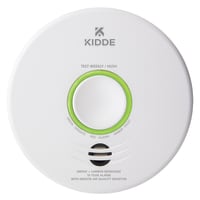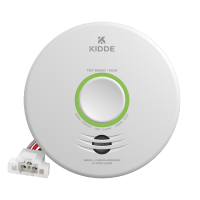Equip your vacation home or rental
According to the latest statistics from the National Fire Protection Association (NFPA), on average, fire claims nine lives in the US every day, with home structure fires accounting for 81 percent of civilian fatalities. Don’t be a statistic; make sure you have up-to-date working smoke and CO alarms on every level of the home, as well as in sleeping areas. For homes with upper-levels, ensure your family knows where escape ladders are stored and how to use them in case of an emergency. Treat your seasonal home or rental just as you would your permanent home.
Purchase alarms optimized by location
When shopping for your smoke and CO alarms, look to purchase each device based on its location optimization. Kidde packaging will state which area of the house a particular alarm is best suited for to ensure optimal performance.
Alarms and batteries have a lifespan
Smoke and CO alarms do not last forever and must be replaced. As a rule, replace smoke alarms every 10 years and CO alarms every five to seven years to benefit from the latest technology upgrades. All Kidde alarms last 10 years. Always remember to change batteries, too, at least once yearly. Or use Kidde Worry-Free 10-year sealed battery alarms and never change a battery for the life of the alarm. Once the alarm has reached the end of its lifespan, it will beep to signify it needs to be replaced.
NEVER disconnect a smoke alarm due to a false alarm
Never remove the batteries or disable an alarm! If an alarm sounds despite no real fire emergency, use its “hush” button to quiet the alarm for about seven minutes while you deal with the source of the alarm trip. The alarm does stay armed, so if the source should become a real fire, the alarm once again will sound.
Learn about CO - the silent killer
According to the Centers for Disease Control, CO poisoning is the leading cause of accidental poisoning deaths in America. CO mixes evenly with air; you can’t see it, smell it, or taste it, but it can be fatal. That is why CO is often referred to as “the silent killer.” Symptoms of exposure, such as headaches and nausea, are often mistaken for the flu and either ignored or misdiagnosed. The only safe way to detect the presence of CO in your home is with a working CO alarm. Models with a digital display show the level of CO in your home. If your CO alarm goes off, get out of your home and call your local fire department.
Have a fire escape plan
Remember that fires can escalate quickly! Only attempt to use a fire extinguisher on a small fire if there is a clear path to safety behind you, and the fire department already has been called. Otherwise, you need to get out right away. Your safety is more important than trying to fight fire by yourself. No matter what, always create and practice an escape plan to ensure your family knows two ways out of every room (if possible) and where to meet outside in case of an emergency. Depending on where you are vacationing, it is especially important to know your exact address when you call for help because cellular location services may not be available in remote areas.
Set yourself up for a safe barbecue or fire
-
Position your barbecue or grill away from the house, deck, and high-traffic and play areas.
-
Use long-handled tools and keep hands and clothing clear of flames and grease spatters. Clean the grill well each time you use it, and replace worn barbecue parts immediately.
-
Store lighter fluid, propane tanks, gasoline for small equipment and other flammables well away from the grill area and the house, and safely out of the reach of children.
-
Monitor propane or natural gas hoses carefully for leaks.
-
Light campfires in a clear area away from the house, other buildings or trees and in a well-defined fire pit. Keep all fires controlled and children away from smoke. Adhere to local fire bans!
Prevention is your best friend
Keep on top of fire-safety maintenance
-
When you are away for long periods of time be sure to inspect and test alarms upon return – including batteries.
-
Frequently check for overloaded or damaged extension cords and replace where needed; be vigilant about old or antique electronics and check for water damage.
-
Clean out grease or dust build-up found on or around household appliances.
-
Always remember to turn off any hot appliances or tools once you finish with them and blow out candles when you leave a room.
-
Ensure potentially flammable items are not left within range of an appliance (for example, curtains near a stove or candle) or in an area at risk of a fire.
-
When closing up your seasonal home or rental at the end of the summer, make sure all electronics and appliances are unplugged and turned off.






